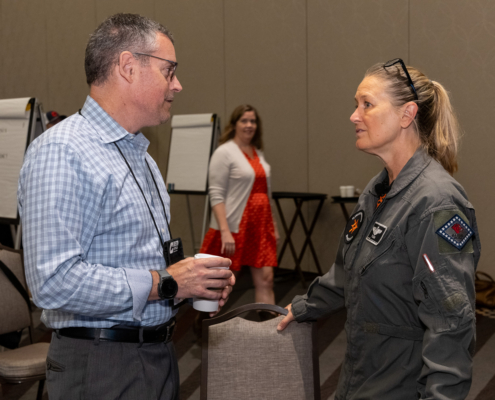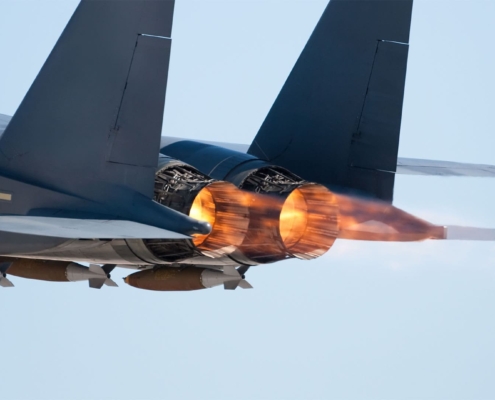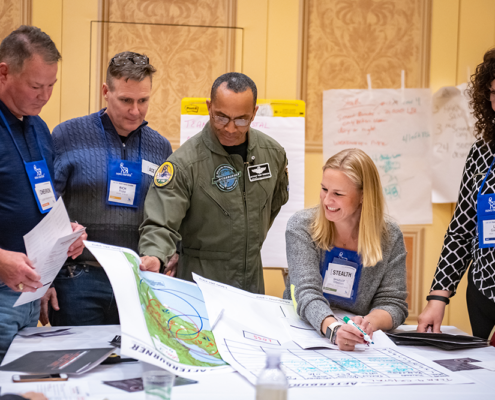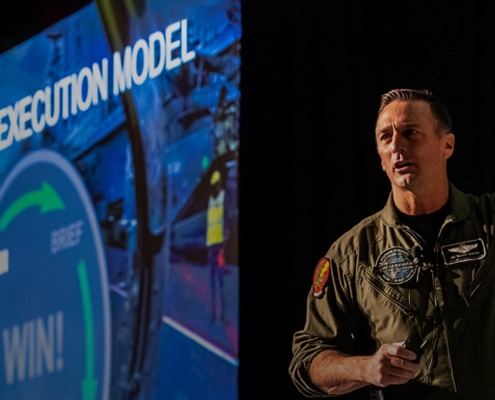 https://www.afterburner.com/wp-content/uploads/2024/11/High-Impact-Leader-Crete2024Summit-677-scaled.jpg
1707
2560
Ansley Anchors
/wp-content/uploads/2024/07/Afterburner-Logo-Resize-Fullcolor-300x93.png
Ansley Anchors2024-11-05 10:52:592024-11-20 14:55:53The Top 5 Attributes of a High-Impact Leader
https://www.afterburner.com/wp-content/uploads/2024/11/High-Impact-Leader-Crete2024Summit-677-scaled.jpg
1707
2560
Ansley Anchors
/wp-content/uploads/2024/07/Afterburner-Logo-Resize-Fullcolor-300x93.png
Ansley Anchors2024-11-05 10:52:592024-11-20 14:55:53The Top 5 Attributes of a High-Impact Leader
Everyone Needs A Wingman In Combat and in Business
Mutual support, what military teams call the “Wingman” concept, is a collection of teamwork principles that have proven to be highly effective in corporate team building. Mutual support is less about an action item on a checklist as it is a shared “mindfulness” present in each member of the team. This shared mindfulness helps team members remained focused on the mission objective and on the team as a whole, enabling individuals to quickly identify and address productivity-draining Task Saturation. Stay on track throughout the execution phase by focusing on these easy-to-remember concepts–Attitude, Altitude, and Aptitude.
Members of High Performing Teams Support Each Other
Attitude
Attitude is about mindfulness of self, team, and environment. It’s a personal commitment to assisting your teammates in accomplishing the mission objective and maintaining the team’s, and your own, Situational AwarenessSM, or “SA”. SA is the awareness an individual has of the interconnected actions, the effects of those actions, and how they must be orchestrated on a daily basis. Without a high degree of SA, team members do not possess an image of reality that will empower them to make good choices, take positive actions, or support others in executing toward goals and building high performance teams.
In aviation, attitude refers to an aircraft’s complex relation to its surroundings. Likewise, attitude also relates to an individual’s personal responsibilities to developing and maintaining SA within the team. SA failures occur every day in every kind of organization. You can likely recall an occasion or two when obvious threats to mission success emerged that no one seemed to notice until it was too late, or when someone had knowledge of a threat but was reluctant to draw attention to it or simply assumed others already knew about it. Attitude is as much a personal commitment to building good team SA as it is to building personal SA.
Altitude
Altitude is a slightly more obvious aviation analogy. A military jet fighter at 30,000 feet is fully mission capable. The pilot can do all the things he or she needs to do to carry out their mission. At 3000 feet, the pilot must increase efforts to avoid hitting the ground, having a negative impact on the pilot’s mission capability as they now have to begin focusing attention there. Below 1000, attention is diverted from all areas that do not immediately serve to prevent hitting the ground. At this point, the pilot has become “mission incapable.” This demonstrates two phenomena:
When we become Task Saturated, we become less effective. We can only respond to those issues that are immediately present or pose an imminent demand or danger.
Functioning at low altitude degrades SA. The closer the fighter jet is to the ground, the less the pilot can see of his environment. He or she will need to gain altitude before regaining a vantage point on the current environment or “image of reality.”
Becoming Task Saturated at a low altitude is not uncommon and can even be unavoidable at times. It’s tough to overcome Task Saturation and gain altitude as an individual, but as discussed above, an individual is not a team. If one team member is flying at 1000 feet, what about the other team members that are flying at 30,000 feet? Those team members have a greater mission capability and a better view and should offer assistance to team members at 1000 feet for the betterment of the whole team. This creates a team that performs at a higher level as it is functioning to support each member in order to create and maintain successful teams.
Aptitude
When you find yourself in a foreign environment, one might tend to lean toward caution as you become adjusted to your surroundings. After a short while, you become more comfortable and less cautious–which can have a lasting, negative impact on your mission. Once focus and attention to detail subside in a relatively unknown environment, the initial caution that compensated for your lack of experience or skill in that realm is no longer sufficient and you risk mission success.
Where might this issue be occurring in your organization? Where is the notional “Aptitude” level below the level of skill and experience? Aptitude issues can be remedied through mindfulness and training around these concepts.
Successful Teams Have to be Built, and That Takes Time
Build Mutual Support and You’re Half-Way There
It’s all about being a good “Wingman”–mission first, team always, self last. A team member that puts the team’s success before their own shows the individual leadership qualities that comprise a high-performing team. If you can build Mutual Support within your team, you’ve won 50% of the fight.
Share This Post
More Like This
 https://www.afterburner.com/wp-content/uploads/2024/11/High-Impact-Leader-Crete2024Summit-677-scaled.jpg
1707
2560
Ansley Anchors
/wp-content/uploads/2024/07/Afterburner-Logo-Resize-Fullcolor-300x93.png
Ansley Anchors2024-11-05 10:52:592024-11-20 14:55:53The Top 5 Attributes of a High-Impact Leader
https://www.afterburner.com/wp-content/uploads/2024/11/High-Impact-Leader-Crete2024Summit-677-scaled.jpg
1707
2560
Ansley Anchors
/wp-content/uploads/2024/07/Afterburner-Logo-Resize-Fullcolor-300x93.png
Ansley Anchors2024-11-05 10:52:592024-11-20 14:55:53The Top 5 Attributes of a High-Impact Leader https://www.afterburner.com/wp-content/uploads/2024/09/fighter-jet-performing-quick-ariel-maneuver.jpeg
1280
1920
Nate Riggins
/wp-content/uploads/2024/07/Afterburner-Logo-Resize-Fullcolor-300x93.png
Nate Riggins2024-01-02 19:53:032024-11-20 14:55:544 Ways to Boost Your Team’s Morale and Hit Your Revenue Targets
https://www.afterburner.com/wp-content/uploads/2024/09/fighter-jet-performing-quick-ariel-maneuver.jpeg
1280
1920
Nate Riggins
/wp-content/uploads/2024/07/Afterburner-Logo-Resize-Fullcolor-300x93.png
Nate Riggins2024-01-02 19:53:032024-11-20 14:55:544 Ways to Boost Your Team’s Morale and Hit Your Revenue Targets https://www.afterburner.com/wp-content/uploads/2024/09/Group_Meeting_2-1.jpeg
1707
2560
Nate Riggins
/wp-content/uploads/2024/07/Afterburner-Logo-Resize-Fullcolor-300x93.png
Nate Riggins2024-01-02 18:26:092024-11-20 14:55:54Fueling Business Agility: The Strategic Pivot
https://www.afterburner.com/wp-content/uploads/2024/09/Group_Meeting_2-1.jpeg
1707
2560
Nate Riggins
/wp-content/uploads/2024/07/Afterburner-Logo-Resize-Fullcolor-300x93.png
Nate Riggins2024-01-02 18:26:092024-11-20 14:55:54Fueling Business Agility: The Strategic Pivot https://www.afterburner.com/wp-content/uploads/2024/09/airborn-fighter-jet-using-afterburners-1.jpeg
1080
1920
Nate Riggins
/wp-content/uploads/2024/07/Afterburner-Logo-Resize-Fullcolor-300x93.png
Nate Riggins2024-01-02 18:19:252024-11-20 14:55:55Combat Distractions and Boost Your Revenue – Fighter Pilot-Style
https://www.afterburner.com/wp-content/uploads/2024/09/airborn-fighter-jet-using-afterburners-1.jpeg
1080
1920
Nate Riggins
/wp-content/uploads/2024/07/Afterburner-Logo-Resize-Fullcolor-300x93.png
Nate Riggins2024-01-02 18:19:252024-11-20 14:55:55Combat Distractions and Boost Your Revenue – Fighter Pilot-Style https://www.afterburner.com/wp-content/uploads/2024/09/jamie-street-_94HLr_QXo8-unsplash-1.jpeg
1380
2048
Nate Riggins
/wp-content/uploads/2024/07/Afterburner-Logo-Resize-Fullcolor-300x93.png
Nate Riggins2024-01-02 15:02:302024-11-20 14:55:553 Steps New Leaders Must Include in Their Strategic Planning Process
https://www.afterburner.com/wp-content/uploads/2024/09/jamie-street-_94HLr_QXo8-unsplash-1.jpeg
1380
2048
Nate Riggins
/wp-content/uploads/2024/07/Afterburner-Logo-Resize-Fullcolor-300x93.png
Nate Riggins2024-01-02 15:02:302024-11-20 14:55:553 Steps New Leaders Must Include in Their Strategic Planning Process https://www.afterburner.com/wp-content/uploads/2024/09/team-looking-at-map-to-focus-on-improving-teamwork-in-the-workplace-1.png
667
1000
Nate Riggins
/wp-content/uploads/2024/07/Afterburner-Logo-Resize-Fullcolor-300x93.png
Nate Riggins2024-01-02 03:00:272024-11-20 14:55:554 Tips for Improving Teamwork in the Workplace
https://www.afterburner.com/wp-content/uploads/2024/09/team-looking-at-map-to-focus-on-improving-teamwork-in-the-workplace-1.png
667
1000
Nate Riggins
/wp-content/uploads/2024/07/Afterburner-Logo-Resize-Fullcolor-300x93.png
Nate Riggins2024-01-02 03:00:272024-11-20 14:55:554 Tips for Improving Teamwork in the Workplace https://www.afterburner.com/wp-content/uploads/2024/09/planning-1.jpeg
933
1400
Nate Riggins
/wp-content/uploads/2024/07/Afterburner-Logo-Resize-Fullcolor-300x93.png
Nate Riggins2023-05-02 20:23:162024-11-20 14:55:58Using Brain Chemistry For Building High-Performance Teams
https://www.afterburner.com/wp-content/uploads/2024/09/planning-1.jpeg
933
1400
Nate Riggins
/wp-content/uploads/2024/07/Afterburner-Logo-Resize-Fullcolor-300x93.png
Nate Riggins2023-05-02 20:23:162024-11-20 14:55:58Using Brain Chemistry For Building High-Performance Teams https://www.afterburner.com/wp-content/uploads/2024/09/afterburner-banner-image-ceo-jim-murphy-giving-a-presentation_crop-1.jpeg
784
1920
Nate Riggins
/wp-content/uploads/2024/07/Afterburner-Logo-Resize-Fullcolor-300x93.png
Nate Riggins2022-11-14 21:30:142024-11-20 14:55:58What If Your Teams Were Truly High Performing?
https://www.afterburner.com/wp-content/uploads/2024/09/afterburner-banner-image-ceo-jim-murphy-giving-a-presentation_crop-1.jpeg
784
1920
Nate Riggins
/wp-content/uploads/2024/07/Afterburner-Logo-Resize-Fullcolor-300x93.png
Nate Riggins2022-11-14 21:30:142024-11-20 14:55:58What If Your Teams Were Truly High Performing?
Top Three Threats to Employee Morale in Today’s Economy
Business Culture, Leadership, Motivation, Team BuildingAbout Us
Building Strong Teams Through the Guidance of Fighter Pilot Keynote Speakers.

